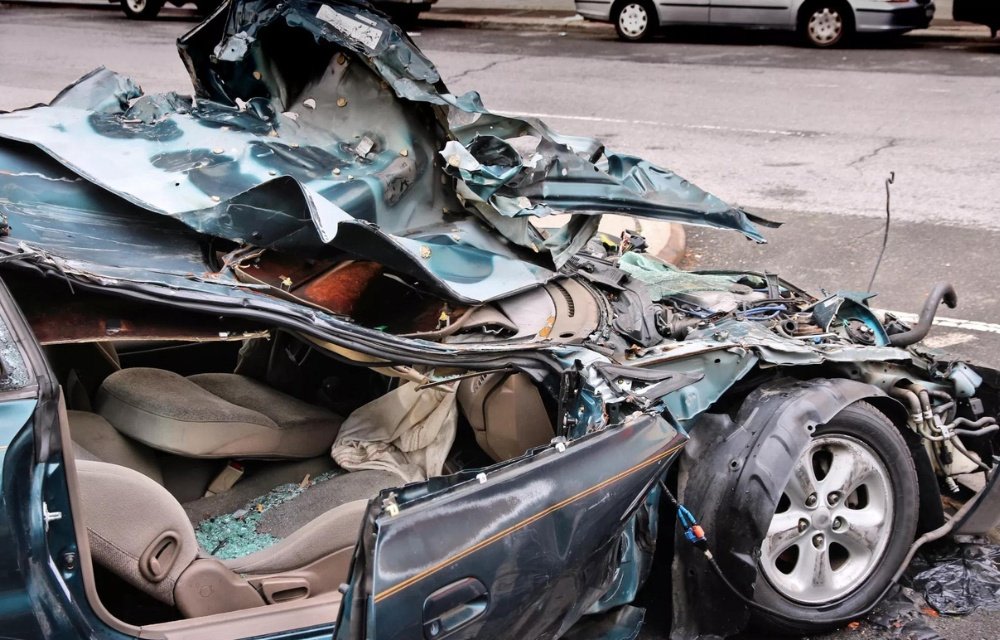
Total Loss Turmoil: Claims Process and Its Outcomes
TABLE OF CONTENTS
Questions Answered:
Leave it to the insurance industry to coin phrases that sound disastrous, like “total loss.” Hear your claims adjuster utter those two words and you might think the world is ending. Fortunately, a total loss with respect to your car isn’t quite that dramatic — though you could be left with some lingering and unwanted financial consequences.
KEY TAKEAWAYS
- 1
If your car is totaled, the insurer will pay you the actual cash value of the vehicle before it was damaged.
- 2
Insurers follow state law when determining whether a car should be declared a total loss. Some states require a claim to be deemed a total loss when the repair costs are greater than 50% of the car’s value; in other states, it’s 100%.
- 3
You can negotiate the value of your totaled vehicle if you can document that the car is worth more.
What is a total loss?
Total loss is a declaration by your insurance provider that the cost to repair your vehicle is close to, or exceeds its actual cash value. In some states, insurers use a threshold percentage for repair costs to decide whether your claim is a total loss. With Alabama, for example, insurers will “total” your car if repair costs are more than 75% of its value. In Iowa, the percentage is only 50%.1
Arizona, California, Hawaii, New Jersey, and New Mexico are a few of the states that have no threshold, but instead, use a total loss formula. The total loss formula compares the total repair costs plus the scrap value to the car’s market value. If the market value is a lesser number, the car will be declared a total loss.
For example, let’s say you drive a 2015 Honda Accord that’s worth about $14,000. Someone smashes into your Accord while it’s parked and the repair estimates are $15,000. In any state, the other driver’s insurance company will likely deem your car a total loss. Instead of paying to have your car fixed, the insurance company would request the car’s title and cut you a check for the market value of the Accord. That’s assuming the other driver has sufficient liability coverage for that claim.
If the damages were your fault, this claim would most likely go against your collision coverage. In that case, your insurer would pay you for the car’s market value, less your deductible.
The total loss process
The total loss process begins when your car incurs serious damage in an accident or other circumstance, like a falling tree. From that point, here are the steps that lead to a total loss declaration and payout.
1. File a claim
Once the damage is incurred, file a claim right away. Depending on the laws in your state and who caused the accident, you might file a claim directly with the other driver’s insurance. That’s called a third-party claim. If the claim goes to your insurer, it’s a first-party claim.
Whichever car insurance provider is responsible, don’t waste any time reporting the damages. Your car probably isn’t drivable at this point, and the sooner you start the process, the faster you’ll be back on the road.
2. Schedule the inspection
The insurer will guide you through the inspection requirements. Typically, the insurance company’s adjuster will have to see the vehicle personally. You may also be able to drop the car off at a repair shop approved by the insurer.
3. Insurer: reviews info and prepares settlement
The adjuster reviews the damages, estimates repair costs, and gets an appraiser to estimate the car’s fair market value. If the car is deemed a total loss, the adjuster prepares a settlement offer that includes your payout amount.
4. Review the settlement
Next, you’ll receive the settlement offer and be asked to sign it. If you agree with the offer, you can prepare to release the vehicle by locating its title and collecting all of your personal belongings from the car. Remember to delete any personal information from the car’s entertainment system, such as Bluetooth pairings and contact information.
5. Release the car
To release the car, you’ll sign and turn over your title and give the insurer permission to move the vehicle. If a lender holds the title, the insurer may ask you to sign a Power of Attorney.
6. Sign and get paid
As a last step, sign your settlement offer and wait for the insurer to cut you a check. If you have an outstanding car loan balance, the insurer will pay the lender its portion of the payout directly.
7. Buy a replacement car
You can start shopping for a replacement car at any time, but it’s often easier to hold off purchasing until your old loan has been paid off. Once you do purchase another car, remember to have it added to your car insurance policy right away — ideally, before you drive off the lot.
How long a total loss claim takes?
A total loss claim can take two weeks to one month to resolve. You can help the process move faster by responding quickly to any information requests from the insurer.
How much do you get for your totaled car?
The amount you’ll get for your totaled car is the “actual cash value.” Insurance carriers must follow state rules and guidelines for determining your car’s actual cash value. Usually, this means they use a third-party appraiser for an objective estimate that’s based on the sale prices of similar vehicles in your area. Note that the actual cash value will be less than what you’d pay for a new version of your car, but it should be enough to buy a similarly used version.
In some states, insurers are also required to compensate you for sales tax associated with buying a new vehicle. The amount of the sales tax reimbursement is based on your payout, and not what you end up spending on a new car. If you get paid $14,000 for your Honda, you’ll get the sales tax on $14,000 — even though you might spend $30,000 buying your next car.
Sales tax reimbursement is more commonly required when you file the claim with your own insurer vs. another driver.2 Even so, if you don’t see a line item on your settlement offer for sales tax, it doesn’t hurt to ask about it.
If you don’t agree with the valuation of your car.
If you don’t agree with the valuation of your car, ask to see the insurer’s car-loss analysis. Review this document carefully to make sure the details describing your vehicles, like mileage, year, and model, are accurate. You can also do your own research on the car’s value by pulling Kelley Blue Book estimates and comparing prices on used car sale listings in your area. Alternatively, you can hire an appraiser to prepare a report for you.
If you can document that your car is worth more than the insurance company has offered, contact your adjuster and try to negotiate a higher payout.
What about my car loan?
Unfortunately, car loans aren’t structured to accommodate a car’s quick loss in value due to depreciation. As a result, many car owners find themselves in the tricky situation of having a loan balance that exceeds the car’s value. Unfortunately, in a total loss situation, your insurer doesn’t care what you owe on your loan. Going back to our Honda Accord example, you’ll get a $14,000 payout if that’s what the car is worth — even if your loan balance is $16,000.
Optional gap coverage on your auto policy is designed to protect you from this situation. But if you don’t have gap coverage, you’d have to fund that $2,000 out of your pocket.
Am I covered for a rental?
You likely aren’t automatically covered for a rental car. Most insurers won’t reimburse you for rental car costs unless you specifically have rental reimbursement coverage on your plan. Check your policy or ask your agent to find out if you have this coverage.
Total loss at its worst
A total loss can be bad for you financially when all of these conditions are true for you:
Owing more on your car loan than the car is worth.
Not having gap coverage.
Don’t have rental reimbursement coverage.
In this case, you’d personally have to cover the debt in excess of your car’s value, plus the cost of your rental car. Oh, and you’ll need to buy a replacement car, too. All of those expenses combined can be tough to absorb, and it’s particularly frustrating if the accident wasn’t your fault.
Consider carefully what coverages you need on your replacement vehicle. Optional gap and rental coverages typically cost less than $100 a year combined.3 You may not have to use them, but they do provide peace of mind at a low cost.4
- Vallet, M. (2019, March 22). Total-loss thresholds by state. Retrieved September 21, 2020, from https://www.carinsurance.com/Articles/total-loss-thresholds.aspx
- Masterson, L. (2020, January 30). Total loss settlements: States requiring insurers to pay your sales tax after a totaled car. Retrieved September 20, 2020, from https://tinyurl.com/322mpkx3
- Honeyager, M. (2020, August 05). What is gap insurance and how much is it? Retrieved September 21, 2020, from https://www.bankrate.com/insurance/car/gap-insurance/
- Marder, A. (2020, April 22). What Is rental reimbursement coverage? Retrieved September 21, 2020, from https://www.nerdwallet.com/article/insurance/rental-reimbursement
TABLE OF CONTENTS


Trying to find the best insurance?
We'll help you find the policy that offers the best value for your situation.
Further Reading

Navigating the Digital Insurance Landscape Considerations
A look at the immense value and high customer lifetime potential within the insurance sector.
Read article

When is Term Life Insurance Worth it?
Decide if term life's advantages are worth it: compare whole vs term life insurance, assess top term providers, and delve into in-depth reviews.
Read article

Insurance Binder: Bridging Between Coverage and Confirmation
From car loans to rental properties, insurance binders are required in a variety of situations. Discover the ins and outs of these essential documents.
Read article

Haven Life Review: Providing Prudent and Protective Policies
Uncover the benefits and drawbacks of Haven Life's term insurance policies, along with eligibility details, pricing, and customer feedback..
Read article
Start Comparing Quotes
Search from our learning center to learn everything from how to easily switch your car insurance to the ins and outs of home insurance.
Fill out just one form and get multiple quotes!


